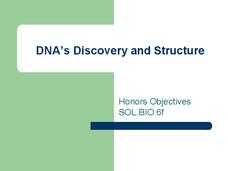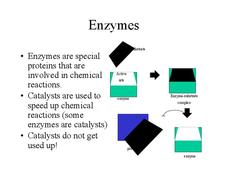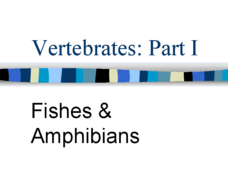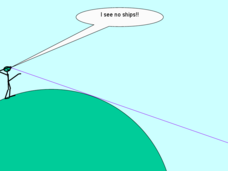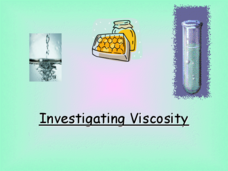Curated OER
DNA's Discovery and Structure
With a professional appearance, this presentation introduces advanced biology learners to the history and structure of the DNA molecule. The details included in this resource are definitely more in-depth than what you would expose a...
Curated OER
Enzymes
With the help of this pair of slides, biology learners will be able to define enzymes and explain the optimal conditions for functioning. The first slide, with simple graphics, shows how enzymes function as catalysts for chemical...
Curated OER
Drugs & The Nervous System
The medicinal uses of different classes of drugs is listed on the first slide. Following slides list examples of each of the different classes. Symptoms of abuse and side effects are also listed. The format of these slides consists...
Curated OER
Human Digestive System
A slide for each major organ of the human digestive system has been collected for this compact presentation. On each slide are bullet points listing characteristics and functions of an organ. The slides are plain white with a single,...
Curated OER
Cnidarian Reproduction and Platyhelminthes
Opening with one slide on cnidarian reproduction, this PowerPoint is more focused on phylum platyhelminthes. It touches on flatworm structure, feeding, body systems, and reproduction. Simple, yet informative, this resource will support...
Curated OER
Ecology
For use early in the year with your ecology class, this collection of slides introduces viewers to cycles in nature and relationships between organisms. There is a food web diagram, but the presentation is incomplete without any diagrams...
Curated OER
Gregor Mendel
There are only five slides in this collection. They will not support an entire lecture, but they may be useful individually. One has a picture of Gregor Mendel and identifies him as the first to trace characteristics of successive...
Curated OER
Mitosis and the Cell Cycle
Uncomplicated and useful, this PowerPoint introduces viewers to the five stages of mitosis. For each stage, there is a slide that lists the main occurrences. Show this as a note-taking guide when you lecture on mitosis to keep your young...
Curated OER
Natural Selection
Biology learners tackle evolution-related concepts when viewing this collection of slides. There are no graphics or photos, just notes in bullet-point style detailing adaptations, evidence for evolution, mechanisms for change, and types...
Curated OER
Nervous System
Are you nervous about teaching the nervous system to your beginning biologists? Worry no more! This PowerPoint provides a note-taking guide and diagrams of the neuron and the brain. Viewers will walk away with a clear...
Curated OER
Primate Evolution
A short slide show lists the unique adaptations of primates, introduces early primates, and examines hominid evolution. Consider adding some drawings or graphics to enliven the presentation.
Curated OER
Vertebrates: Part I, Fishes & Amphibians
A simple set of slides shares the three classes of fish and the class amphibia. The first three slides cover fish characteristics and structure, while the last three cover amphibian characteristics and life cycle. Though somewhat...
Curated OER
Viruses: Dead or Alive?
A brief presentation introduces viewers to the world of viruses. Viral structure, virus categories, and the lytic cycle are displayed. The first slide needs to include actual diagrams of viruses to make the structure clear. The final...
Curated OER
What Makes a Plant a Plant?
For a plant unit in your biology curriculum, here is a slide show that bestows the basics of plant structure, reproduction, and classification. The information is general. The main point of the lesson is to highlight what characterizes...
Curated OER
Protists
With this collection of slides, future biologists get to view photographs of protozoans from different phyla. Interspersed with the photos are bullet-style notes listing characteristics of each group. Unfortunately, most of the pictures...
Curated OER
Properties of Water
Biology and chemistry learners alike will benefit from this presentation about the properties of water. It reveals that most of its unique characteristics are due to the hydrogen bonding within the water molecule. Attractive graphics...
Curated OER
Jeopardy
Providing an interactive experience, this Jeopardy-style game leads players through a review of scientific concepts. The presentation covers topics such as sound, the Earth's layers, magnetism, and the states of matter. This would be a...
Curated OER
Animal Skeletons
Medium-quality photographs of different animal skeletons make up this presentation. It is designed to first show the skeleton, and then with another click of the mouse, the name of the animal appears. Use it as a guessing game for upper...
Curated OER
Earth is Round
This series of images shows how ancient people figured out that the world was round. Each slide shows a ship moving around the globe and coming closer to the line of the observer's sight. This is a very simple resource that you could use...
Curated OER
Energy
All work and no play make Jack a dull boy, while all text and no graphics make Energy a dull presentation. It is informative, teaching viewers about work, conservation of energy, and sources that can be used to generate electricity. It...
Curated OER
Hibernation
Explain the process behind animal hibernation. This text-rich presentation provides clear information related to weather, animal behaviors, and their coping mechanisms.
Curated OER
Investigating Viscosity
Viewers define viscosity as resistance to flowing and they compare the viscosity of different liquids. Instructions are not provided, but junior scientists design an experiment to test different liquids and order them from low to...
Curated OER
Guessing Body Parts
Kids can guess the image as each colorful square is removed to reveal a little part of the whole picture. They attempt to guess each of 12 different body parts before all of the squares are removed. This is a fun way to review the parts...
Curated OER
My Body
Assist your littlest learners in identifying the parts of their bodies. Each slide contains a labeled image of an individual body part. Arms, legs, hands, and feet to mention a few. Tip: Turn this visual presentation into a kinesthetic...
Other popular searches
- Earth Science
- Physical Science
- Life Science
- Science Project
- Science Space
- Environment Science
- History of Science
- Environmental Science
- Pe Science
- Family and Consumer Science
- Consumer Science
- Social Science
